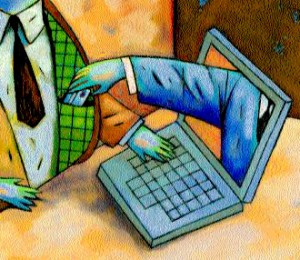
According to a survey from security training firm PhishMe, employees working from home could be an easy back door allowing targeted attacks to get behind an organisation’s email defences.
In a poll of 1,000 UK office workers, 49 percent said they were more concerned about being targeted at home than work, with another 36 percent believing the risk was about the same in either environment.
The absolute level of phishing attacks experienced was low but more than half said they received between one and nine such emails per day, with nearly six percent getting more than ten.
More than one in five said they’d been tricked into clicking on phishing links in the past.
The overwhelming majority claimed they would be suspicious of emails that appeared to come from their IT department asking for account verification, but a small minority would either click on the link or reply asking for more details.
About a quarter of respondents weren’t 100 percent sure what phishing was.
Reading between the lines, the biggest weakness of all is simply that workers often don’t see themselves as targets, particularly when outside the officce, assuming that only higher-level staff will be targeted in the work environment.
“Some employees falsely believe that their role isn’t important enough for a hacker to attempt to spearphish them, said PhishMe CTO Aaron Higbee.
“If the attacker’s main goal is to simply obtain access to an internal network, they won’t discriminate. Everyone is a potential target. Their methods are increasingly more sophisticated and use social media more and more to tailor-made emails that trick people into opening them,” he said.
Once an employee has been tricked the risk is that the infection will be carried back into that person’s organisation via a laptop, USB stick or even directly via a VPN.
In using this design, phishing criminals are simply employing lateral thinking. Employees have different browsing and probably email habits when in their own home environment, whether using company laptops or their own.
“Most people use very little security at home to protect their PCs, at most AV software, so the skills they learn at work can help them enormously when spotting a scam or phishing attack which otherwise could cost them dearly.”
US-based PhishMe started marketing its anti-phishing training system in the UK last August. The principle is simply to defend against phishing by changing the way employees recognise and react to it.